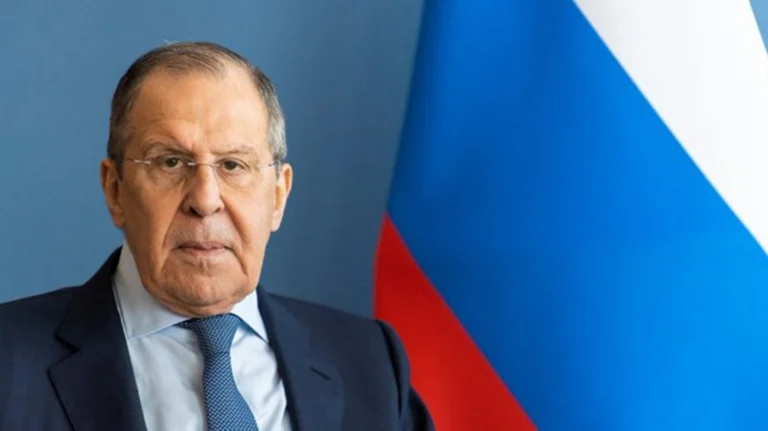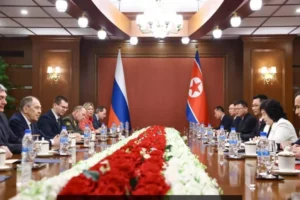Critical 3-Way Shift: Russia-North Korea Alliance Reshapes Asia-Pacific Security Amid Escalating Tensions

Russian FM Sergei Lavrov. X/ @LuxFella
July 12, 2025 Hour: 11:57 am
Russia and North Korea reinforce their alliance amid rising U.S. pressure in Asia-Pacific. Lavrov warns against militarization and affirms mutual defense under the Russia-North Korea alliance
Related: Europe Wants War Against Russia: FM Lavrov
Wonsan, North Korea, July 12, 2025 — Russian Foreign Minister Sergey Lavrov emphasized that the Russia-North Korea alliance is essential for regional stability in the face of growing U.S. aggression and militarization in the Asia-Pacific. Speaking during a bilateral strategic dialogue in Wonsan, Lavrov warned against expanding military blocs like NATO into Asia and called for a new framework of mutual, non-aligned security.
The talks marked the second round of high-level diplomatic engagement between the two nations since the signing of their comprehensive strategic partnership treaty in 2024. The meeting also included discussions on maritime cooperation, historical ties, and joint resistance to Western pressure.

Lavrov Warns Against Militarization and Exclusive Alliances
Lavrov stressed the importance of building “reliable mechanisms for ensuring equal and indivisible security for all states,” based on non-aligned approaches. He criticized the formation of exclusive military alliances by external and regional actors, calling such moves “counterproductive and dangerous.”
He specifically warned the United States, South Korea, and Japan against exploiting their trilateral alliance to exert pressure on Russia and North Korea, noting that these actions only heighten regional instability rather than promote peace.
🔗 TASS – Russia-North Korea Strategic Talks
Recognition of North Korea’s Defensive Nuclear Posture
During the talks, Lavrov praised North Korea’s foresight in developing its nuclear deterrent well before recent attacks on Iran, suggesting that this has helped prevent direct military threats against Pyongyang despite rising tensions in the region.
“The DPRK’s nuclear program is defensive and deterrent in nature, developed by its own scientists. We respect their actions and understand why they pursue it,” Lavrov stated, reaffirming Russia’s support for North Korea’s sovereign right to self-defense.
Russia Committed to Preventing Regional Provocations
Lavrov reiterated that Russia will work to counter provocations from the U.S., Japan, and South Korea aimed at destabilizing the Korean Peninsula. During his meeting with North Korean Foreign Minister Choe Son-hui, both sides agreed to resume maritime communication channels to strengthen bilateral cooperation.
The Russian minister also highlighted the historical bond between the two nations, recalling North Korea’s contribution to the liberation of Kursk during World War II. He described the relationship as an “invincible brotherhood” rooted in shared values and resistance to foreign interference.
Geopolitical Implications of the Russia-North Korea Alliance
The 2024 strategic treaty between Russia and North Korea has solidified a political and military partnership aimed at countering U.S. dominance in the Asia-Pacific. Lavrov’s statements about NATO’s eastward expansion reflect broader concerns in Moscow over the increasing militarization of the region and the potential for conflict escalation.
Russia advocates for a new model of global governance based on sovereignty, peaceful cooperation, and balanced security — in contrast to what it describes as exclusionary Western alliances that fuel international tensions.
🔗 Russian Ministry of Foreign Affairs – Official Statement
Conclusion: A Strategic Counterweight in Asia-Pacific
The Russia-North Korea alliance continues to evolve as a strategic bulwark against perceived U.S. aggression in Northeast Asia. At a time of heightened geopolitical volatility, Moscow is doubling down on its alliance with Pyongyang, promoting a regional security framework grounded in equality, non-alignment, and mutual defense.
As tensions rise across the Pacific, the deepening partnership between the two nations signals a shift in the balance of power — one that challenges existing Western-led alliances and offers an alternative vision for peace and stability in the region.
Author: JMVR
Source: Sputnik



